Abstract
Chronic fatigue syndrome (CFS) is an idiopathic disorder characterized by fatigue that is markedly exacerbated by physical exertion. In the present study, we tested the hypothesis that mild exercise (walking 1 mph [1 mile = 1.609 km] for 30 min) would provoke serum cytokine and cerebral blood flow abnormalities of potential pathogenic importance in CFS. Interleukin-1 beta, interleukin-6, and tumor necrosis factor alpha were nondetectable in sera of CFS patients (n = 10) and healthy control subjects (n = 10) pre- and postexercise. At rest, serum transforming growth factor beta (TGF-beta) levels were elevated in the CFS group compared with the control group (287 +/- 18 versus 115 +/- 5 pg/ml, respectively; P < 0.01). Serum TGF-beta and cerebral blood flow abnormalities, detected by single-photon emission-computed tomographic scanning, were accentuated postexercise in the CFS group. Although these findings were not significantly different from those in the control group, the effect of exercise on serum TGF-beta and cerebral blood flow appeared magnified in the CFS patients. Results of this study encourage future research on the interaction of physical exertion, serum cytokines, and cerebral blood flow in CFS that will adopt a more rigorous exercise program than the one used in this study.
Full text
PDF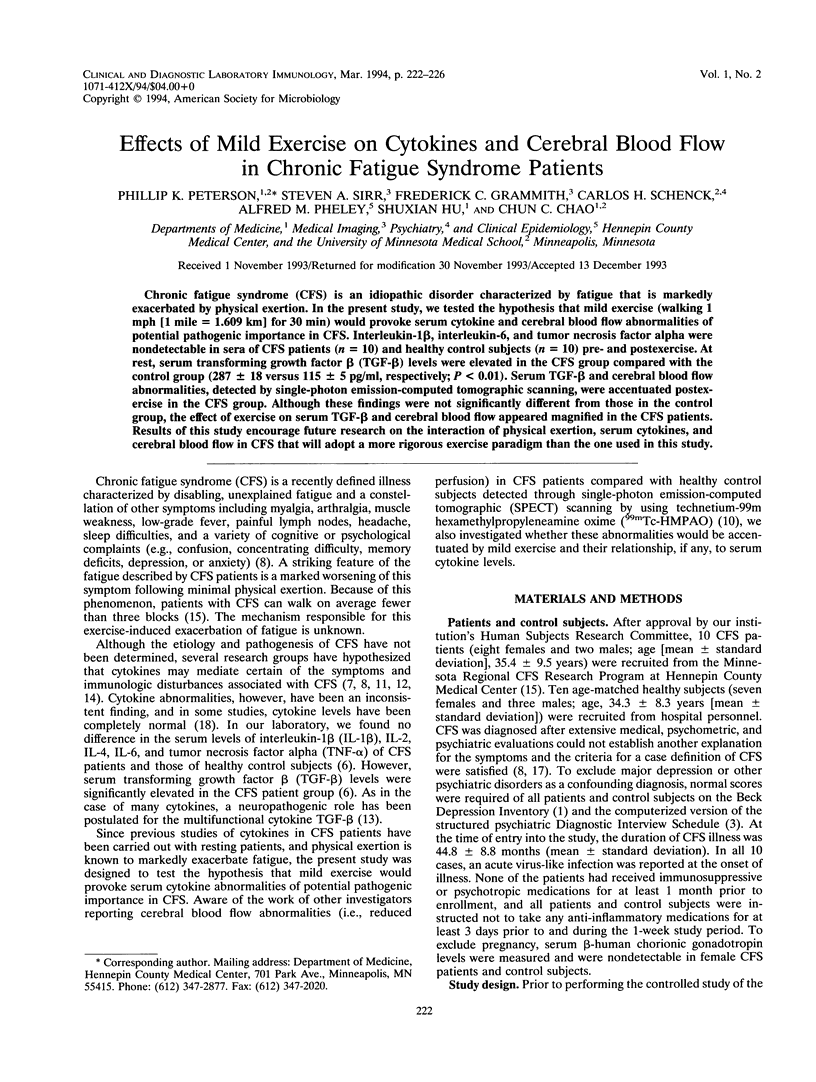
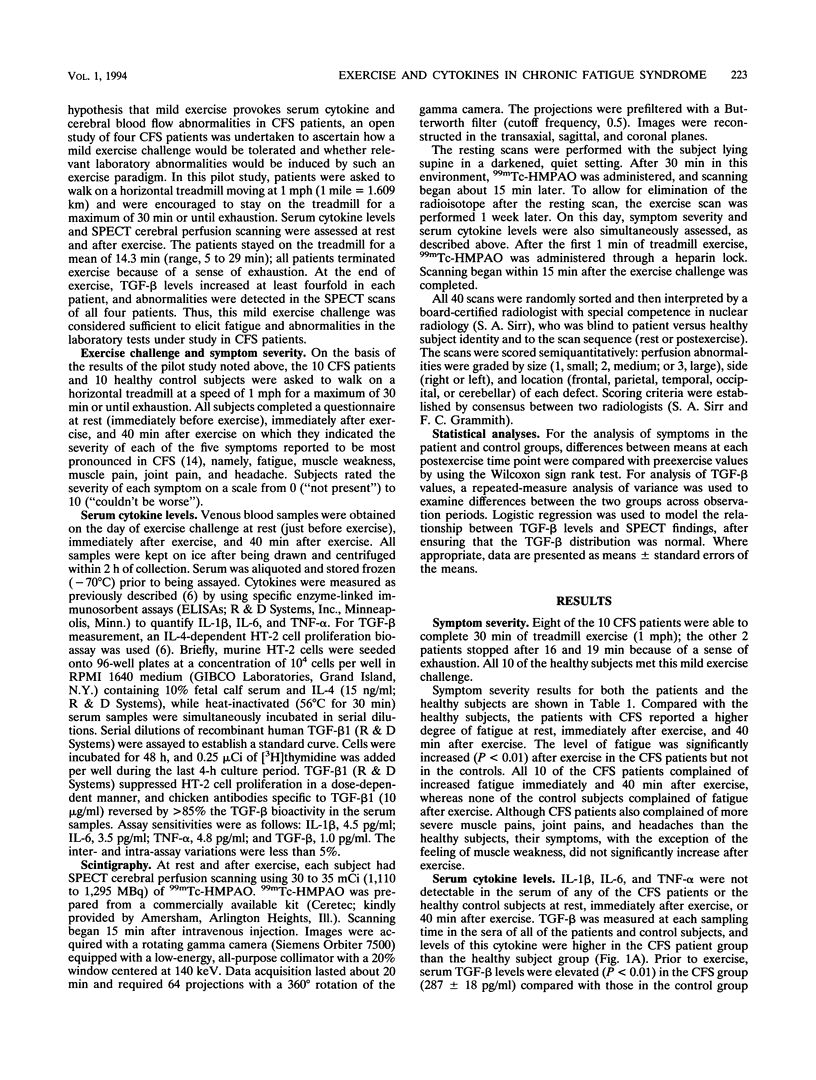
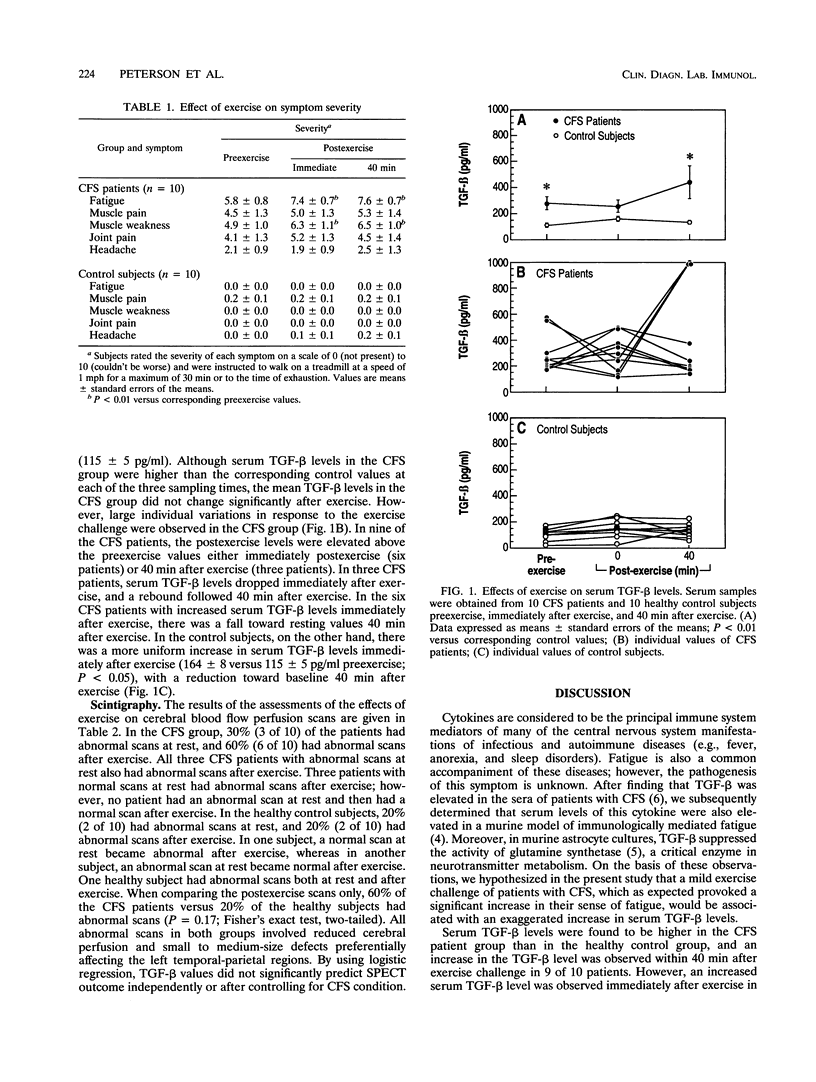
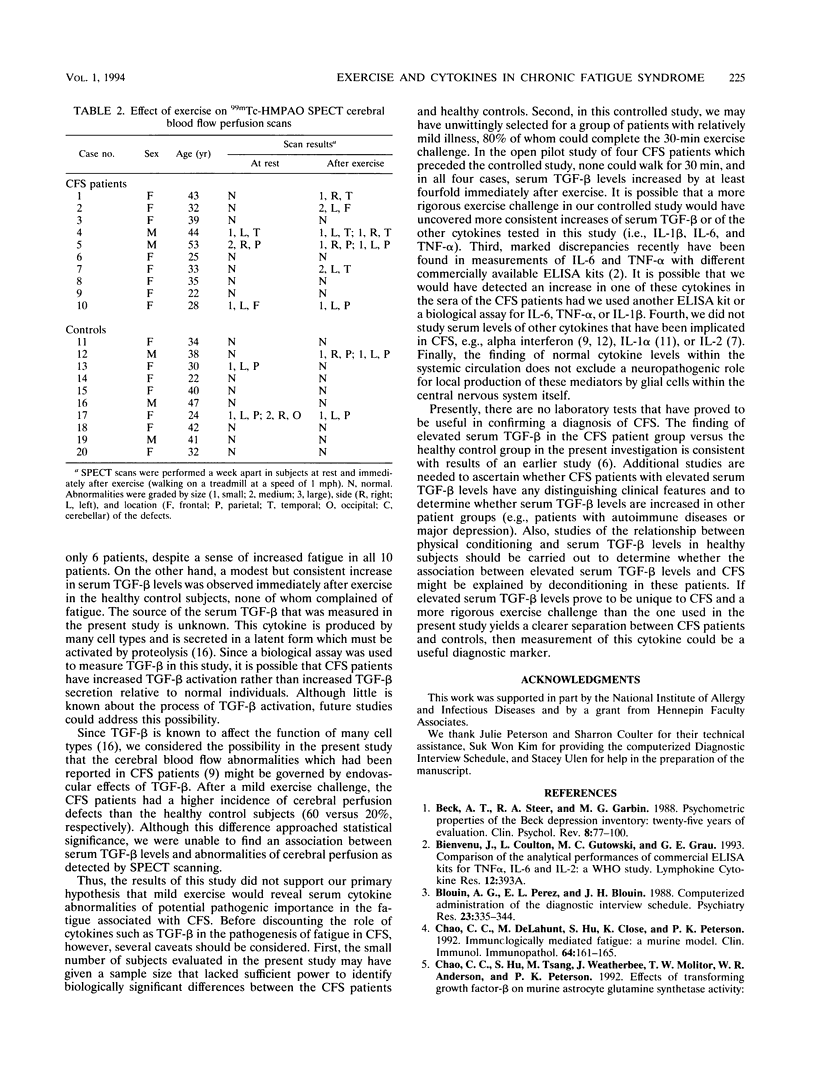
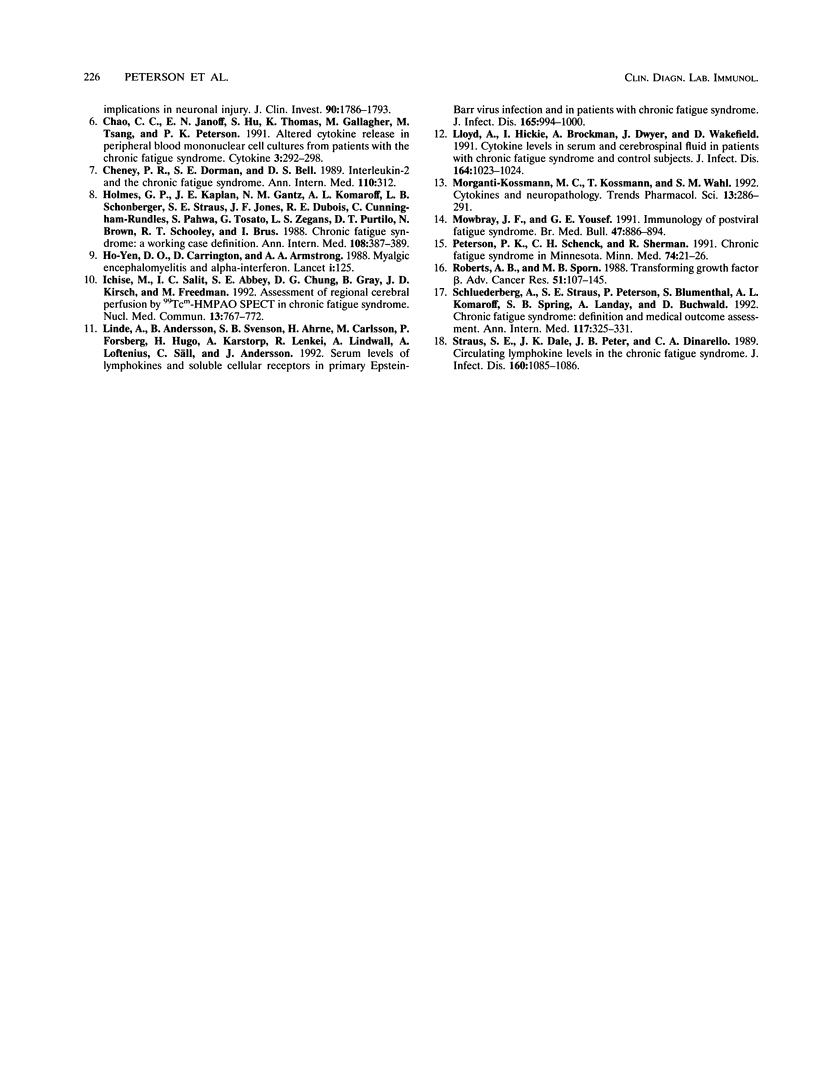
Selected References
These references are in PubMed. This may not be the complete list of references from this article.
- Blouin A. G., Perez E. L., Blouin J. H. Computerized administration of the Diagnostic Interview Schedule. Psychiatry Res. 1988 Mar;23(3):335–344. doi: 10.1016/0165-1781(88)90024-8. [DOI] [PubMed] [Google Scholar]
- Chao C. C., DeLaHunt M., Hu S., Close K., Peterson P. K. Immunologically mediated fatigue: a murine model. Clin Immunol Immunopathol. 1992 Aug;64(2):161–165. doi: 10.1016/0090-1229(92)90194-s. [DOI] [PubMed] [Google Scholar]
- Chao C. C., Janoff E. N., Hu S. X., Thomas K., Gallagher M., Tsang M., Peterson P. K. Altered cytokine release in peripheral blood mononuclear cell cultures from patients with the chronic fatigue syndrome. Cytokine. 1991 Jul;3(4):292–298. doi: 10.1016/1043-4666(91)90497-2. [DOI] [PubMed] [Google Scholar]
- Ho-Yen D. O., Carrington D., Armstrong A. A. Myalgic encephalomyelitis and alpha-interferon. Lancet. 1988 Jan 16;1(8577):125–125. doi: 10.1016/s0140-6736(88)90329-7. [DOI] [PubMed] [Google Scholar]
- Holmes G. P., Kaplan J. E., Gantz N. M., Komaroff A. L., Schonberger L. B., Straus S. E., Jones J. F., Dubois R. E., Cunningham-Rundles C., Pahwa S. Chronic fatigue syndrome: a working case definition. Ann Intern Med. 1988 Mar;108(3):387–389. doi: 10.7326/0003-4819-108-3-387. [DOI] [PubMed] [Google Scholar]
- Ichise M., Salit I. E., Abbey S. E., Chung D. G., Gray B., Kirsh J. C., Freedman M. Assessment of regional cerebral perfusion by 99Tcm-HMPAO SPECT in chronic fatigue syndrome. Nucl Med Commun. 1992 Oct;13(10):767–772. [PubMed] [Google Scholar]
- Linde A., Andersson B., Svenson S. B., Ahrne H., Carlsson M., Forsberg P., Hugo H., Karstorp A., Lenkei R., Lindwall A. Serum levels of lymphokines and soluble cellular receptors in primary Epstein-Barr virus infection and in patients with chronic fatigue syndrome. J Infect Dis. 1992 Jun;165(6):994–1000. doi: 10.1093/infdis/165.6.994. [DOI] [PubMed] [Google Scholar]
- Lloyd A., Hickie I., Brockman A., Dwyer J., Wakefield D. Cytokine levels in serum and cerebrospinal fluid in patients with chronic fatigue syndrome and control subjects. J Infect Dis. 1991 Nov;164(5):1023–1024. doi: 10.1093/infdis/164.5.1023. [DOI] [PubMed] [Google Scholar]
- Morganti-Kossmann M. C., Kossmann T., Wahl S. M. Cytokines and neuropathology. Trends Pharmacol Sci. 1992 Jul;13(7):286–291. doi: 10.1016/0165-6147(92)90087-m. [DOI] [PubMed] [Google Scholar]
- Mowbray J. F., Yousef G. E. Immunology of postviral fatigue syndrome. Br Med Bull. 1991 Oct;47(4):886–894. doi: 10.1093/oxfordjournals.bmb.a072518. [DOI] [PubMed] [Google Scholar]
- Peterson P. K., Schenck C. H., Sherman R. Chronic fatigue syndrome in Minnesota. Minn Med. 1991 May;74(5):21–26. [PubMed] [Google Scholar]
- Roberts A. B., Sporn M. B. Transforming growth factor beta. Adv Cancer Res. 1988;51:107–145. [PubMed] [Google Scholar]
- Schluederberg A., Straus S. E., Peterson P., Blumenthal S., Komaroff A. L., Spring S. B., Landay A., Buchwald D. NIH conference. Chronic fatigue syndrome research. Definition and medical outcome assessment. Ann Intern Med. 1992 Aug 15;117(4):325–331. doi: 10.7326/0003-4819-117-4-325. [DOI] [PubMed] [Google Scholar]
- Straus S. E., Dale J. K., Peter J. B., Dinarello C. A. Circulating lymphokine levels in the chronic fatigue syndrome. J Infect Dis. 1989 Dec;160(6):1085–1086. doi: 10.1093/infdis/160.6.1085. [DOI] [PubMed] [Google Scholar]



